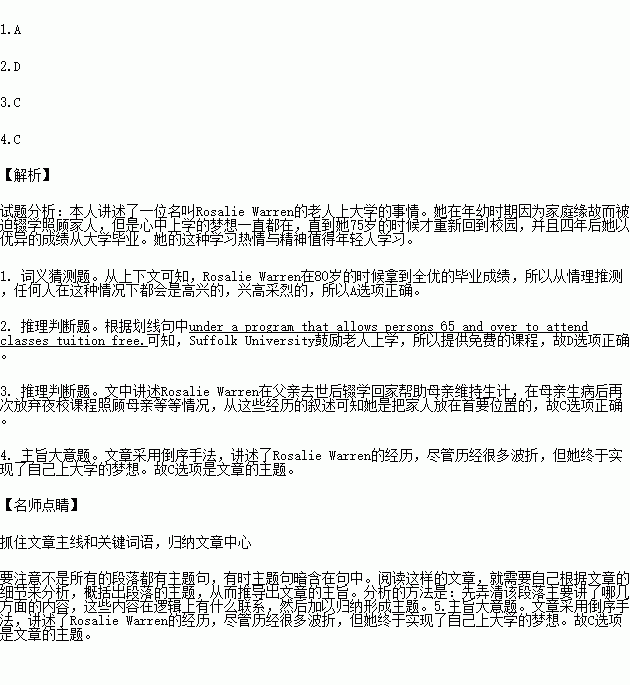题目内容
As Rosalie Warren stood at the mailbox in the lobby of her apartment building in May 1980, she shared the anxiety of many other college seniors. In her hand was an envelope containing her final grades. As she nervously opened it, Warren wondered whether her hundreds of hours of studying had paid off.
They had.
“I got five A’s,” she still recalls with elation. “I almost fell on the floor!”
Warren would graduate from Suffolk University with a Bachelor of Science degree in philosophy and history at age 80. Three years later, at age 83; she would receive her second degree from Suffolk, a master’s in education.
Now, with both diplomas proudly displayed in her apartment, Warren is not finished with learning. Now 93, she continues for her 18th year at Suffolk under a program that allows persons 65 and over to attend classes tuition free. “It’s my life to go to school, to enjoy being in an academic atmosphere,” she says. “That’s what I love.”
Warren was born Rosalie Levey on Aug.29, 1900. Two years after she entered high school, her father died. Warren had to leave school for factory work to help support her family’s 10 children. Warren describes herself as a “person who always liked school,” and she says the move “broke my heart completely because I couldn’t finish high school.”
In the end, however, “I went to school nights,” she recalls. “Any place I could find an outlet of learning and teaching, I was there.”
A short time later, her mother became ill, and Warren had to care for her, once again putting her education on hold.
Finally, in 1921, her mother, now recovered, drew from her saving to send Warren to Boston University for two years to study typing, stenography, and office procedures.
Those courses helped Warren gain several long-term office positions over the next 60 years, but her great desire “to be in the academic field” continued.
In 1924, she married Eugene Warren, and seven years later, her daughter, Corinne, was born. In 1955, by then a widow and a grandmother, Warren took a bus tour across the United States that was to last nine months. She said she wanted to see “things you never see in the West End.”
When she returned home, she took a bookkeeping position and also enrolled in courses in philosophy, sociology and Chinese history.
In 1975, when she was 75, Warren learned from a neighbor about Suffolk University’s tuition-free program for senior citizens.” I was at the registrar’s office the very next day,” she recalls. At first, she took one or two courses at a time, but encouraged by her professors, she enrolled as a degree candidate.
“I had not studied for so many years,” she says, “but I was determined.” For the next four years, Warren, who calls herself a “student of philosophy,” worked toward her degree.
Nancy Stoll, dean of students at Suffolk, says Warren is “an interesting role model for our younger students—that learning is a lifetime activity...She is genuinely enthusiastic about being here, and that permeates (散发) her activities and is contagious (传染的) to students and faculty.”
1.What does the word elation mean in the sentence “I got fives A’s”, she still recalls with elation”?
A. Great happiness.B. Great surprise.
C. Great pride.D. Great honor.
2.Which statement can be inferred from the underlined sentences?
A. Because Warren needn’t pay her tuition; she went to study at Suffolk University.
B. At first Warren had to pay for her courses at Suffolk University.
C. Most of the students at Suffolk University are older than 65.
D. Suffolk University encourages older people to take courses.
3.It can be inferred from this passage that Rosalie Warren _______.
A. came from a wealthy family
B. didn’t like working in an office
C. put her family before her education
D. didn’t like her family very much
4.What is the main topic of this passage?
A. Rosalie Warren’s family
B. Rosalie Warren’s life
C. Rosalie Warren’s education
D. Rosalie Warren’s studying at Suffolk University

